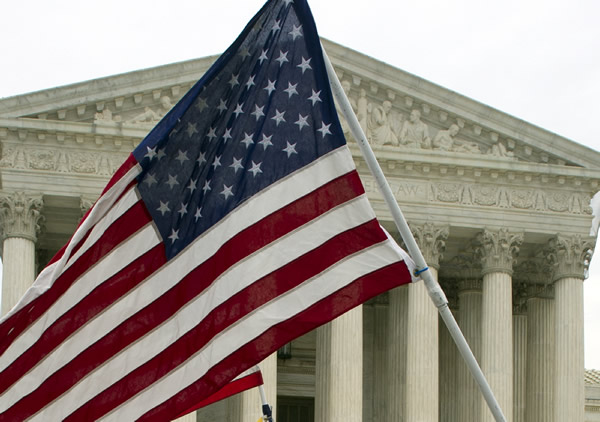Yesterday, the United States Court of Appeals for the Ninth Circuit upheld a California high school’s prohibition on American flag t-shirts on Cinco de Mayo. The case is Dariano v. Morgan Hill Unified School District, and while it might get the law right, it certainly highlights a worrying trend in American schools: the inability or unwillingness to protect students whose speech is unpopular.
On Cinco de Mayo, May 5, 2010, three students wore American flag t-shirts to Live Oak High School. Live Oak, according to the Ninth Circuit, had a history of gang and racial violence. The students who wore the American flag t-shirts were threatened with physical violence. Rather than discipline the students who made the threats, the school decided to tell the American flag t-shirt-wearing students that they could either turn their shirts inside-out, or go home. Two of the students went home, and the students collectively sued the school district in federal district court, claiming that the school violated their First Amendment rights.
Yesterday, the Ninth Circuit upheld the dismissal of the students’ claim, on the grounds that school officials “anticipated violence or substantial disruption of or material interference with school activities, and their response was tailored to the circumstances.”
In the landmark 1969 case of Tinker v. Des Moines Independent Community School District, the Supreme Court of the United States upheld the First Amendment right of students to peacefully protest the Vietnam War by wearing black armbands to school. In a famous passage, the Court opined that neither students nor teachers “shed their constitutional rights to freedom of speech or expression at the schoolhouse gate.”
However, the Tinker case did give wide latitude to K-12 school officials to regulate conduct that would “materially and substantially interfere” with school operations. In yesterday’s case, the Ninth Circuit held that under Supreme Court First Amendment law in the K-12 context, it was “reasonable for school officials to proceed as though the threat of a potentially violent disturbance was real,” and to order the removal of the American flag t-shirts as a result.
While this result might be legally correct, it is still troubling. The admission that school officials in California have no control over their violent students is not something to be proud of. Intuitively, Americans recoil against the so-called “heckler’s veto.” A heckler’s veto is where a peaceful exercise of speech rights is shut down because that speech might offend other people, and those other people are or might be violent. State sanction of the heckler’s veto has been repeatedly struck down by the Supreme Court outside of the school context. Just because cartoons of Mohammad might lead to riots does not allow a police department to arrest a publisher; just because a Nazi speaking in Central Park might cause others to riot does not allow New York City to deny his permit.
Yet in this case, a heckler’s veto occurred, and worked. The peaceful wearing of American flag t-shirts was prohibited because school officials were unable to protect those wearing them. The bad actions of anti-American-flag-t-shirt students effectively shut down the speech. Lawful or not, Live Oak High School evidently has huge problems if it cannot protect its students or maintain school discipline.
































5 Replies to “Federal Court Upholds School Ban on American Flag T-Shirts”